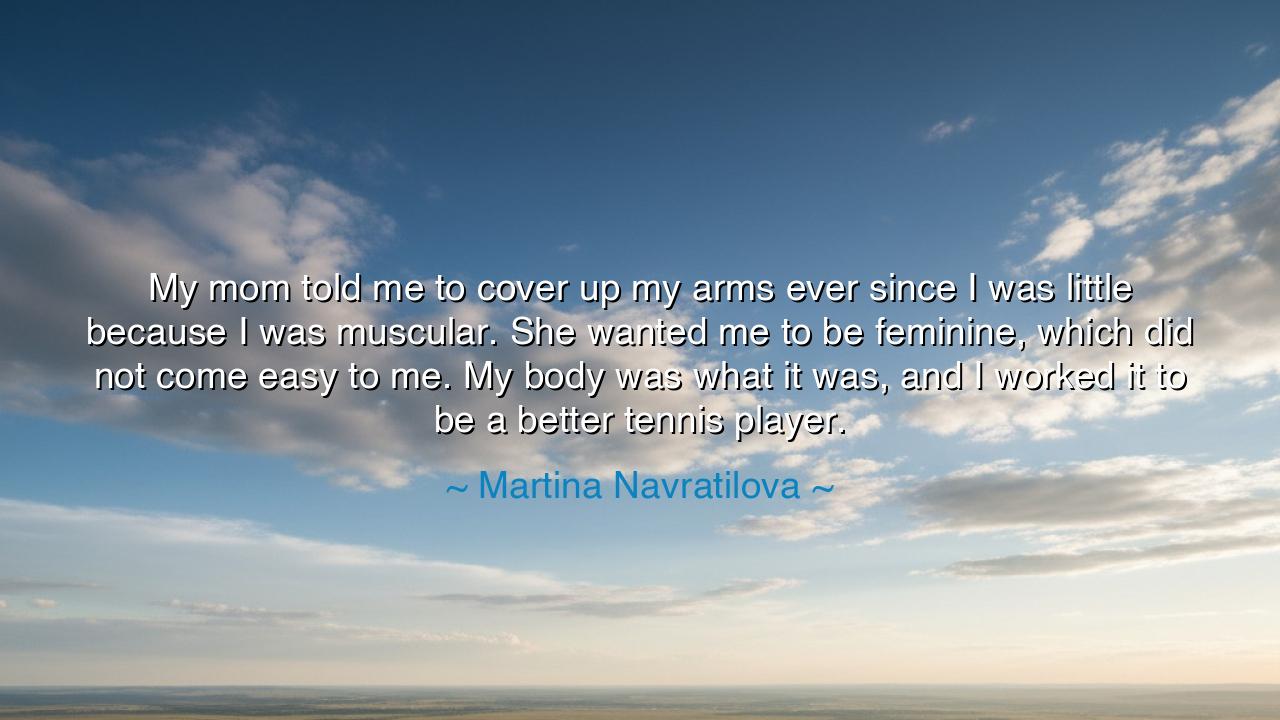
My mom told me to cover up my arms ever since I was little
My mom told me to cover up my arms ever since I was little because I was muscular. She wanted me to be feminine, which did not come easy to me. My body was what it was, and I worked it to be a better tennis player.






There are struggles that arise not from external foes, but from the tension between society’s expectations and the truth of one’s own body. Martina Navratilova, reflecting on her youth, said, “My mom told me to cover up my arms ever since I was little because I was muscular. She wanted me to be feminine, which did not come easy to me. My body was what it was, and I worked it to be a better tennis player.” In these words lies the eternal conflict between imposed ideals and personal excellence. Navratilova’s reflection illuminates the courage required to embrace one’s natural gifts, even when they defy conventional notions of gender or beauty.
Her struggle was both personal and cultural. From the earliest times, societies have dictated how the human form should appear, how gender should be expressed, and what traits are deemed acceptable. In ancient Greece, male athletes were celebrated for muscularity, yet women were expected to embody softness and delicacy. Navratilova’s mother, perhaps influenced by such cultural norms, wished her daughter to appear feminine, but Martina’s natural strength and muscularity were central to her athletic identity. Here we see the tension between conformity and authenticity—a theme as old as civilization itself.
Navratilova’s insistence on working her body to excel in tennis reflects the nobility of purpose over aesthetic expectation. Ancient philosophers like Aristotle taught that virtue is realized through practice and cultivation of one’s natural gifts. Similarly, Navratilova honed her muscular body not to fit an imposed ideal, but to maximize her potential as a tennis player. Her muscles were not a contradiction to femininity; they were a testament to dedication, resilience, and mastery of craft.
History offers many examples of individuals confronting societal expectations to achieve greatness. Consider Harriet Tubman, whose physical strength and endurance defied the expectations of her enslaved status, allowing her to lead countless souls to freedom. Or Amelia Earhart, whose pursuits in aviation challenged norms of femininity in her era. Like Navratilova, these figures embraced their natural abilities as instruments of purpose rather than instruments of conformity, demonstrating that true excellence requires fidelity to self rather than adherence to expectation.
The tension Navratilova experienced between appearance and function also carries a lesson in self-acceptance. To deny one’s natural form is to resist the vessel through which one experiences life. The body, in its unique form, is both tool and identity. Navratilova’s embrace of her muscularity allowed her to cultivate not only athletic skill, but confidence and agency. Ancient sages would recognize this principle: the harmonious alignment of nature, purpose, and action is central to flourishing.
Her reflection further highlights the complexity of parental influence. Her mother’s guidance, though well-meaning, reflected societal norms rather than individual truth. Many young people struggle to reconcile familial expectation with personal identity. Navratilova’s story demonstrates that while advice and direction from elders are valuable, discernment is necessary: the cultivation of self must ultimately respect one’s own strengths, passions, and authentic form.
From this reflection emerges a universal lesson: embrace your natural gifts, even when they conflict with cultural expectations. Strength, appearance, and capability are not merely physical traits; they are instruments of purpose, shaping identity and achievement. Navratilova’s determination shows that mastery, confidence, and fulfillment arise when one aligns effort with authentic self, rather than conforming to external ideals.
Thus, let Martina Navratilova’s words guide us: honor your body, cultivate your strengths, and pursue your purpose with diligence and courage. Resist the pressure to conform blindly, but temper boldness with skillful cultivation. In doing so, one transforms natural ability into extraordinary accomplishment, demonstrating that authenticity and excellence are not opposites, but complementary forces that shape the highest human achievement.






AAdministratorAdministrator
Welcome, honored guests. Please leave a comment, we will respond soon